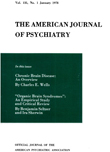Countertransference Reactions to Violent Patients
Abstract
Treating violent patients can evoke countertransference reactions of fear and anger in therapists that may interfere with effective management. The authors present six case reports in which countertransference reactions deleteriously affected the treatment outcome. They stress the importance of the physician's being aware of his fear and of how this fear may distort, by projection, his view of the patient as being dangerous.
Access content
To read the fulltext, please use one of the options below to sign in or purchase access.- Personal login
- Institutional Login
- Sign in via OpenAthens
- Register for access
-
Please login/register if you wish to pair your device and check access availability.
Not a subscriber?
PsychiatryOnline subscription options offer access to the DSM-5 library, books, journals, CME, and patient resources. This all-in-one virtual library provides psychiatrists and mental health professionals with key resources for diagnosis, treatment, research, and professional development.
Need more help? PsychiatryOnline Customer Service may be reached by emailing [email protected] or by calling 800-368-5777 (in the U.S.) or 703-907-7322 (outside the U.S.).



